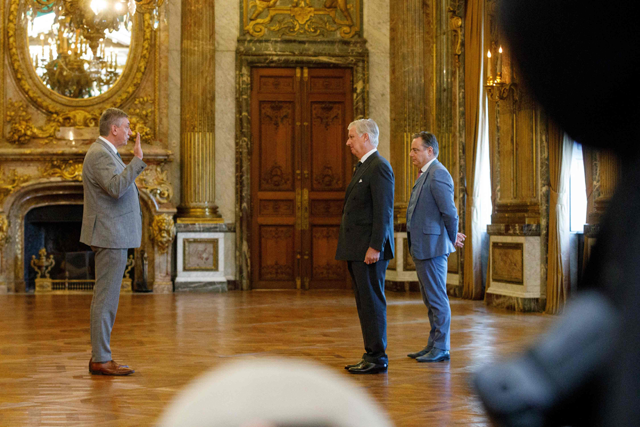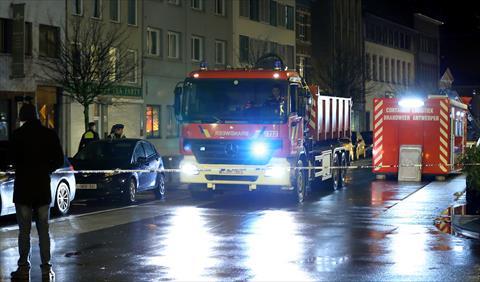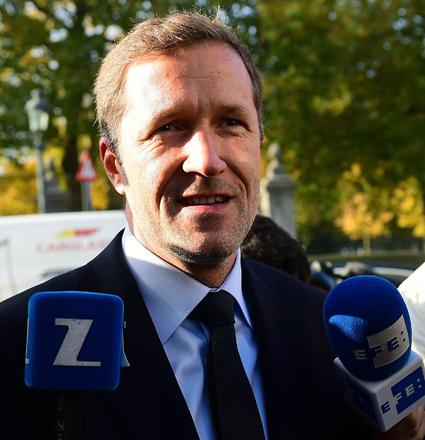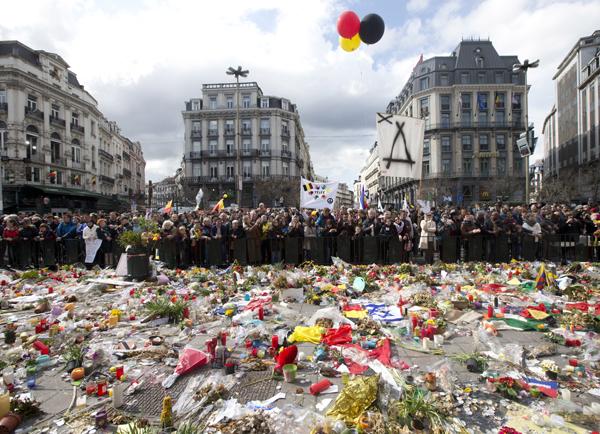You are here
Belgium moves to right as new PM De Wever sworn in
By AFP - Feb 03,2025 - Last updated at Feb 03,2025

Vice-prime minister and Minister of Finance, Combating Tax Fraud, Pensions, National Lottery and Cultural Institutions Jan Jambon raises his hand in front of Belgium's Prime Minister Bart De Wever and King Philippe - Filip of Belgium during the oath taking ceremony of the new Prime Minister and members of the federal government at The Royal Palace in Brussels on Monday - Belgium OUT (AFP photo)
BRUSSELS, Belgium — Conservative Bart De Wever was sworn in Monday as Belgium's new prime minister, after striking a hard-fought coalition deal that moves the country to the right.
Reached after seven months of tortuous negotiations, the agreement makes De Wever the first nationalist from Dutch-speaking Flanders to be named Belgian premier.
A law-and-order candidate whose coalition has already promised to crack down on irregular migration, De Wever's rise to power reinforces a marked right-wing shift in European politics.
The 54-year-old, who in recent years has backed off on calls for Flanders to become an independent country, took the oath of office before King Philippe at the royal palace in Brussels.
From there, he headed straight to a gathering of EU leaders a few blocks away, for talks on defence and transatlantic relations — quipping to reporters that he was "jumping right in".
On the day's headline topic, De Wever said Belgium was committed to meeting NATO's longstanding defence spending target of two percent of GDP, up from 1.3 percent at present.
"Europe has been a bit lazy on the topic of defence," he said — arguing that Russian President Vladimir "Putin has woken us up."
Faced with a twin challenge from President Donald Trump — threatening trade tariffs as well as pressuring allies to ramp up defence spending — De Wever said the EU needed to preserve its "relationship with the United States."
De Wever's N-VA party is part of the hard-right ECR group in the European Parliament, which also includes lawmakers from the parties of Italian Prime Minister Giorgia Meloni and Czech leader Petr Fiala.
"Our ECR group now has three prime ministers at the European Council table and participates in the government of seven countries," French hard-right lawmaker Marion Marechal rejoiced on X.
Hard-right parties, often riding anti-immigrant sentiment, performed strongly in European Parliament elections last year, and have topped recent national and regional votes in Austria, Germany and the Netherlands.
60-hour-marathon
Split between French- and Dutch-speaking communities and with a highly complex political system, Belgium has an unenviable record of painfully protracted coalition discussions — reaching 541 days back in 2010-2011.
This time around, five groups sought to forge a coalition after June elections that failed to produce a clear majority — with talks led by De Wever's N-VA which claimed the most seats.
The new government brings together three parties from Dutch-speaking Flanders: the N-VA, the centrist Christian-Democrats and the leftist Vooruit (Onward).
And it includes two from French-speaking Wallonia: the centrist Les Engages and the centre-right Reformist Movement.
Together, they hold an 81-seat majority in Belgium's 150-seat parliament.
Coalition talks hit a wall during the summer over the issue of plugging the country's budget deficit — estimated at 4.6 percent of gross domestic product in 2024, one of the highest in the European Union.
Belgium is one of seven EU countries facing disciplinary action for running a deficit above three percent of GDP, in violation of the bloc's fiscal rules.
De Wever, the mayor of Antwerp since 2013, has pushed for cuts in social benefits and pension reforms that have already sparked opposition from labour unions.
He had threatened to throw in the towel if no coalition deal was reached Friday.
An agreement was struck with just hours to go after a 60-hour marathon session to iron out differences over an 800-page programme.
But the gender makeup of the new government has raised some eyebrows, with 11 men and just four women.
De Wever's N-VA was already part of a right-leaning ruling coalition between 2014 and 2018.
He takes over from outgoing prime minister Alexander De Croo, whose seven-party coalition took an arduous 493 days to emerge back in 2019-2020.
De Croo had stayed on as caretaker leader after the June elections.
Related Articles
Brussels – Belgian rescuers found two dead bodies early Tuesday at the site of a powerful suspected gas explosion in the port city of Antwer
BRUSSELS — European leaders voiced hope for a breakthrough Wednesday in troubled negotiations for a landmark EU-Canada free trade deal, desp
BRUSSELS — Around 7,000 people in Brussels marched against militant violence on Sunday, nearly a month after suicide blasts on Europe's inst



















